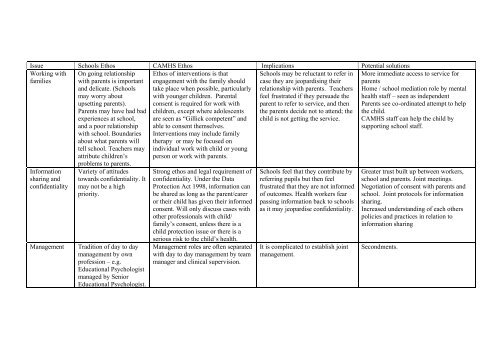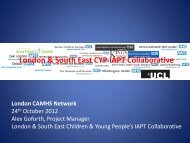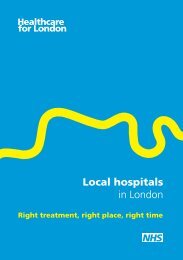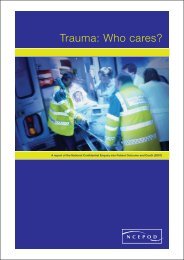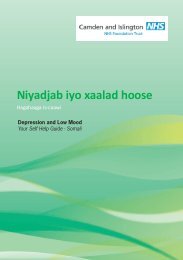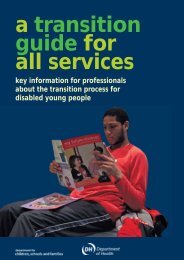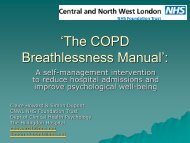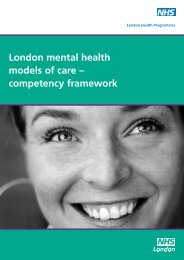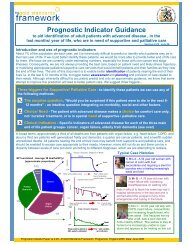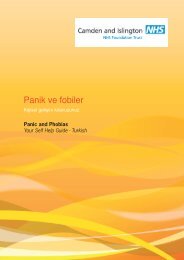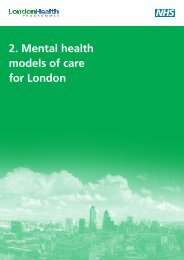(CAMHS) and Schools - London Health Programmes
(CAMHS) and Schools - London Health Programmes
(CAMHS) and Schools - London Health Programmes
Create successful ePaper yourself
Turn your PDF publications into a flip-book with our unique Google optimized e-Paper software.
Issue <strong>Schools</strong> Ethos <strong>CAMHS</strong> Ethos Implications Potential solutions<br />
Working with<br />
families<br />
Information<br />
sharing <strong>and</strong><br />
confidentiality<br />
Management<br />
On going relationship<br />
with parents is important<br />
<strong>and</strong> delicate. (<strong>Schools</strong><br />
may worry about<br />
upsetting parents).<br />
Parents may have had bad<br />
experiences at school,<br />
<strong>and</strong> a poor relationship<br />
with school. Boundaries<br />
about what parents will<br />
tell school. Teachers may<br />
attribute children’s<br />
problems to parents.<br />
Variety of attitudes<br />
towards confidentiality. It<br />
may not be a high<br />
priority.<br />
Tradition of day to day<br />
management by own<br />
profession – e.g.<br />
Educational Psychologist<br />
managed by Senior<br />
Educational Psychologist.<br />
Ethos of interventions is that<br />
engagement with the family should<br />
take place when possible, particularly<br />
with younger children. Parental<br />
consent is required for work with<br />
children, except where adolescents<br />
are seen as “Gillick competent” <strong>and</strong><br />
able to consent themselves.<br />
Interventions may include family<br />
therapy or may be focused on<br />
individual work with child or young<br />
person or work with parents.<br />
Strong ethos <strong>and</strong> legal requirement of<br />
confidentiality. Under the Data<br />
Protection Act 1998, information can<br />
be shared as long as the parent/carer<br />
or their child has given their informed<br />
consent. Will only discuss cases with<br />
other professionals with child/<br />
family’s consent, unless there is a<br />
child protection issue or there is a<br />
serious risk to the child’s health.<br />
Management roles are often separated<br />
with day to day management by team<br />
manager <strong>and</strong> clinical supervision.<br />
<strong>Schools</strong> may be reluctant to refer in<br />
case they are jeopardising their<br />
relationship with parents. Teachers<br />
feel frustrated if they persuade the<br />
parent to refer to service, <strong>and</strong> then<br />
the parents decide not to attend; the<br />
child is not getting the service.<br />
<strong>Schools</strong> feel that they contribute by<br />
referring pupils but then feel<br />
frustrated that they are not informed<br />
of outcomes. <strong>Health</strong> workers fear<br />
passing information back to schools<br />
as it may jeopardise confidentiality.<br />
It is complicated to establish joint<br />
management.<br />
More immediate access to service for<br />
parents<br />
Home / school mediation role by mental<br />
health staff – seen as independent<br />
Parents see co-ordinated attempt to help<br />
the child.<br />
<strong>CAMHS</strong> staff can help the child by<br />
supporting school staff.<br />
Greater trust built up between workers,<br />
school <strong>and</strong> parents. Joint meetings.<br />
Negotiation of consent with parents <strong>and</strong><br />
school. Joint protocols for information<br />
sharing.<br />
Increased underst<strong>and</strong>ing of each others<br />
policies <strong>and</strong> practices in relation to<br />
information sharing<br />
Secondments.


